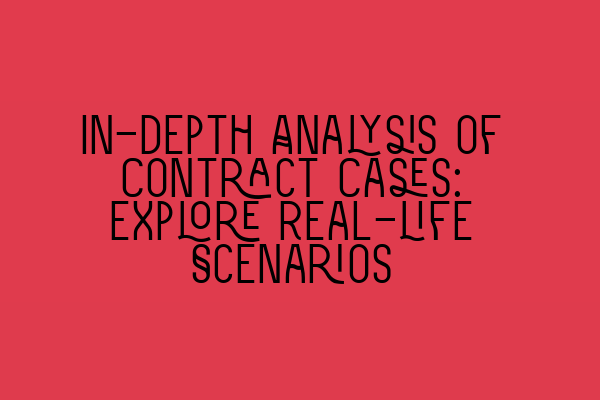In-depth Analysis of Contract Cases: Explore Real-life Scenarios
Contracts are the backbone of business transactions, ensuring that parties involved understand and agree on their rights and obligations. However, disputes can arise, leading to contract cases that require in-depth analysis and legal expertise. In this article, we will explore real-life contract scenarios, examining key aspects and legal principles involved.
Before we dive into the cases, it’s important to understand the basics of contract law. A contract is a legally binding agreement between two or more parties, where each party agrees to perform certain obligations. To form a valid contract, several essential elements must be present: offer, acceptance, consideration, intention to create legal relations, and certainty of terms.
Case 1: Breach of Contract in a Construction Project
Consider a scenario where a contractor agrees to build a commercial property for a developer. The contract specifically states a completion date and penalties for delays. However, the contractor fails to complete the project on time, causing financial losses to the developer.
In this case, the developer may file a lawsuit against the contractor for breach of contract. The court will evaluate several factors, including whether the delay was justified, the extent of the financial losses incurred, and the reasonableness of the penalties imposed. It is crucial to analyze the specific terms of the contract and any applicable construction laws.
Related Article: Delaware Corporate Law for UK Solicitors: Key Insights and Practices
Case 2: Dispute Over Intellectual Property Rights
Imagine a situation where two companies enter into a licensing agreement, granting one company the right to use the other company’s patented technology. However, the licensee starts using the technology beyond the agreed-upon scope, infringing on the licensor’s intellectual property rights.
The licensor may file a lawsuit, seeking an injunction to stop the licensee’s unauthorized use and claiming damages for the infringement. To analyze this case, it is essential to examine the specifics of the licensing agreement, the scope of the granted rights, and the applicable intellectual property laws.
Related Article: Complying with Legal Obligations: Delaware LLCs in the UK
Case 3: Invalid Contract Due to Misrepresentation
In certain instances, a contract may be deemed invalid if one party made a false statement that influenced the other party’s decision to enter into the contract. This is known as misrepresentation. Let’s consider a scenario where a seller falsely represents the quality of a product to entice a buyer into purchasing it.
If the buyer discovers the misrepresentation, they can seek various remedies, such as rescission of the contract or claiming damages. The court will examine the nature and impact of the misrepresentation, considering factors like whether it was innocent, negligent, or fraudulent. It’s crucial to analyze the specific statements made and their effect on the contract.
Related Article: Expert Insights: Solicitors in UK Courts – Tips and Strategies for Success
In conclusion, contract cases require a comprehensive analysis of the specific circumstances and applicable legal principles. Each case presents unique challenges and requires an in-depth understanding of contract law. By examining real-life scenarios like breaches of contract, intellectual property disputes, and misrepresentation cases, we can gain valuable insights into the complexities of contract law.
Related Articles:
